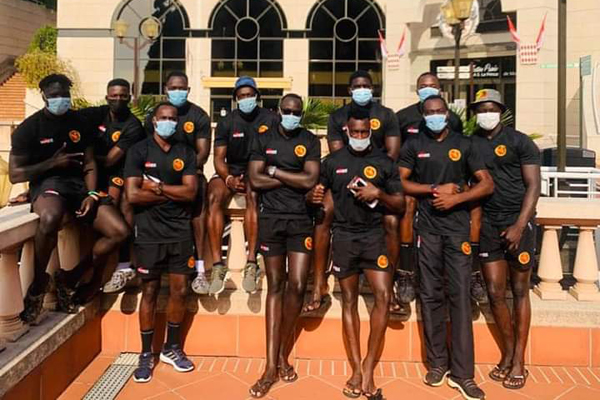Covid costs Uganda global engagement

Tough times. The Rugby 7s players in a group photo at their hotel in Monaco before the Covid debacle. PHOTO | COURTESY
Uganda woke up to the news that a member of the first contingent to travel to Tokyo ahead of the 2020 Olympics that start on July 21 had tested positive for Covid-19.
The asymptomatic individual, believed to be coach Patrick Lihanda, is reportedly in a quarantine in Tokyo while the eight other members that include the three boxers: Catherine Nanziri, David Ssemujju, Shadir Musa Bwogi, swimmer Atuhaire Ambala and weightlifter Julius Ssekitoleko are already in camp in Izumisano City.
Before all this happened, the sports fraternity was still coming to terms with the fact that several athletes in the national Rugby Cranes 7s camp that had flown to Monaco for the Repechage Olympics qualifier had tested positive and the team had subsequently been ousted from the tournament.
At the beginning of the month, the Lady Cricket Cranes had to pull out of the Kwibuka Women’s T20 Tournament in Kigali, Rwanda, over Covid-positive cases.
So how did we get here?
Uganda Rugby Union (URU) president Godwin Kayangwe insists: “We did everything we could and had the players in camp for three days before travelling.”
“They even tested negative while here. Maybe if we had money, we could have camped longer.”
Bio-bubble camps are a sure way to protect players but only if there is no laxity in handling them.
Uganda Cricket Association, for example, had just in May managed to successfully send the Cricket Cranes to Windhoek, Namibia, for the Castle Lite Series.
Laxity in camps
But apparently, after keeping the women’s side in a bubble for two weeks, the team managers let their guard down, on compassionate grounds, to allow the girls “say bye” to their parents.
Unfortunately, the second wave of the pandemic was in full flow and it did not spare the bye-bidding players.
“If that is the case with cricket, it did not happen with these ones (Olympic team) as they were in camp in Kavumba before they travelled,” Uganda Olympic Committee chief Donald Rukare said.
Almost two weeks ago, the athletes made courtesy visits to KCCA and ABSA offices as the two organisations had provided support for their preparations.
“But that was over 10 days ago and they were tested and still returned negative tests. Besides that, the entire team is fully vaccinated,” Rukare added.
What UOC could not control, however, were visits from outsiders. We could, for example, not verify if Uganda Boxing Federation president Moses Muhangi’s visits to the camp were sanctioned. Or the courtesy visit from Pastor Robert Kayanja, who gave each boxer $300 (about Shs1m).
But questions linger on, especially about the capacity of the country to effectively test for the virus because the players did test negative twice in 72 hours before leaving for Tokyo.
Concerns over the efficacy of the AstraZeneca vaccine and realisations that doctors are just learning more about the new disease also show that whatever we do might not be enough to prevent anyone from catching the virus.
“The virus may be undetectable at the time the sample is taken. Also, if the sample was not taken properly, like if the swab did not reach as far back in the nostril as possible, it could give wrong diagnosis,” Patricia Namubiru, a hockey player and laboratory technician at Medical Research Council, Entebbe, said.
Human errors
It is also believed that in such camps, some people, especially coaches, retain the leeway to leave and come in at will. A source in the Olympic camp pointed to “some cases of indiscipline in the boxing team could have brought to this.”
For context, when Cranes goalkeeping coach Fred Kajoba was suspended from camp in March for flouting Covid-19 guidelines ahead of the pre-Chan tournament in Cameroon, he argued in an interview with KFM Sports that he “asked for permission to go and pray” and “had seen others like the assistant coach (Abdallah Mubiru) leave camp.”
Some federations are running the risk because they outrightly cannot afford to put players in camp.
“Residential training is the way to go but we can’t afford it. For example, the Gazelles (women’s basketball team) are supposed to do non-residential training but with the current events, we must put them in camp for two weeks,” Nasser Sserunjogi, the basketball head, said.
Some positives
The non-residential camps worked for some federations, like Uganda Hockey Association, ahead of the Bi-nation Series in Kenya, after the first wave but they just cannot cut in current times.
The tennis national and U-17 teams are holding their breath and hoping they will have the all-clear to compete in Congo Brazzaville and Junior Davis Cup in Egypt – they flew out yesterday.
Back home, President Museveni, in a televised address on Friday, said sports, alongside churches and mosques, are “congregating settings and are a source that fuels rapid virus transmission,” hence pushing the sector into another lockdown for 42 days ending July 30.
Before then, three of Uganda’s other four Olympic contingents will have travelled to Tokyo on June 29, July 6, July 20. The marathoners travel in August.
“The good thing is that the athletes are leaving early and testing upon arrival. This gives us time to handle any arising situations,” Rukare said.




